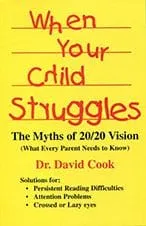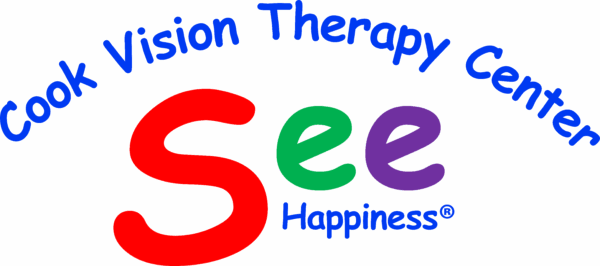Learning Disability
Does My Child Have a Vision Problem or a Learning Disability?
“We had really run the gamut of specialists from learning specialists to doctors of every sort. I came here wanting to be hopeful, but feeling very skeptical. I am convinced–and very grateful.”
The term “Learning Disability,” while it may sound frightening, merely means that a child is performing in school below the potential predicted by intelligence. In other words, an otherwise bright child who struggles with some area of schoolwork will often be diagnosed as “Learning Disabled” and placed in special classes.
Studies have shown that 90 percent of children with learning disabilities have problems with one or more of their visual abilities. Such children see the words blur, double or “dance.” They cannot find their places during reading and board work. They cannot use their eyes to guide their hands. When such visual ability problems are added to other learning problems, these children can fall further and further behind even though they are receiving the best of teaching. This frustration is the fault of neither the teacher nor the student, both of whom generally have no idea there is a vision problem.
Once the vision problem is eliminated, either the teacher or a well-trained tutor can fill in the missing learning skills and real progress can be made. If vision was the only problem to begin with, the child will be “cured” of the “learning disability.” If there are other learning problems as well, then the child will at least have the chance to benefit from proper instruction aimed at those other problems, rather than spending his time struggling to “see.”
Introduction to Learning Disabilities & Vision
Is your child’s learning struggle actually a hidden vision problem? For Marietta families, the answer could be closer than you think.
Bright children who underperform in school often face misdiagnosed vision issues. Research shows 90% of learning disabilities involve undetected visual problems, such as poor eye tracking or blurred vision. At Cook Vision Therapy Center in Atlanta, GA, we’ve spent 40+ years helping Metro Atlanta families, including Marietta parents, uncover and treat vision-related learning barriers. Whether it’s dyslexia, ADHD, or struggles with 3D vision, our specialized therapy targets the root cause—not just the symptoms.
Signs Your Child’s Struggle May Be Vision-Related
Watch for these common signs in Marietta students:
-
Blurred or double vision during reading or screen time.
-
Frequent headaches after schoolwork.
-
Skipping lines or losing place in text (common in dyslexia cases).
-
Poor hand-eye coordination affects sports or handwriting.
-
Avoidance of close-up tasks like reading or puzzles.
If these sound familiar, your child may have a functional vision problem, not a learning disability. At Cook Vision Therapy Center, we serve Marietta families with comprehensive testing to pinpoint issues like eye teaming or lazy eye (amblyopia). Early intervention can prevent years of academic frustration.
How Vision Problems Mimic Learning Disabilities
Many children in Marietta and Metro Atlanta are mislabeled with learning disabilities like ADHD or dyslexia when their struggles actually stem from undiagnosed vision issues. At Cook Vision Therapy Center, we’ve spent 40+ years uncovering these hidden challenges. Here’s how vision problems disguise themselves—and how targeted therapy can help:
1. Convergence Insufficiency: The ADHD Imposter
When a child’s eyes struggle to focus together (convergence insufficiency), tasks like reading or board work become exhausting. They might fidget, lose focus, or avoid schoolwork—behaviors often mistaken for ADHD. At Cook Vision Therapy Center, we use customized exercises to strengthen eye coordination, helping Marietta kids stay engaged without medication.
2. Poor Eye Tracking: Masking as Dyslexia
If your child skips lines, mixes up letters, or reads slowly, teachers may suspect dyslexia. However, shaky eye movements (poor tracking) can cause identical symptoms. Our Atlanta-based therapy programs stabilize tracking skills, letting kids decode words confidently—a game-changer for frustrated Marietta families.
3. Strabismus or Lazy Eye: Misread as “Laziness”
Crossed eyes (strabismus) or a “lazy eye” (amblyopia) can make reading, sports, or 3D tasks feel impossible. Children may be unfairly labeled as unmotivated. At Cook Vision Therapy Center, we offer non-surgical solutions to align eyes and improve depth perception, helping Metro Atlanta students thrive in and out of the classroom.
Why Marietta Families Trust Us:
“Vision issues often hide in plain sight,” says Dr. John Cook, founder of Cook Vision Therapy Center. “We’ve helped hundreds of Metro Atlanta children, including Marietta students, overcome ‘learning disabilities’ by fixing their vision first.”
FAQs: Learning Disabilities & Vision Problems
-
How can I tell if my child's learning disability is due to vision issues?
Look for blurred/double vision, losing place while reading, or poor eye-hand coordination. A Marietta developmental optometrist can perform a functional vision assessment to identify underlying issues.
-
What are common signs of vision-related learning problems?
-
Why are vision problems mistaken for learning disabilities?
-
Will vision therapy in Marietta, GA improve my child’s learning disability?
-
What percentage of learning disabilities involve vision problems?
-
How do vision problems impact school performance?
-
Can fixing vision issues resolve a learning disability?
-
Who should I consult first in Marietta for learning struggles?
-
How does vision therapy help learning disabilities?
Check Out Our Resources
Dr. Cook’s Publications:
- Authored books VISUAL FITNESS and WHEN YOUR CHILD STRUGGLES.
- Published articles in top optometric journals.
- His article “Eyesight, infinity and the human heart” was voted “Best Non-Technical Article” by the Association of Optometric Editors.





